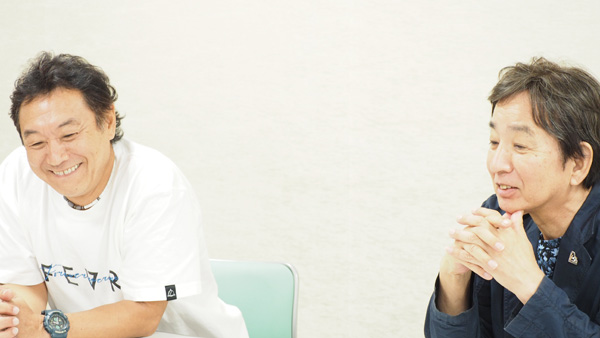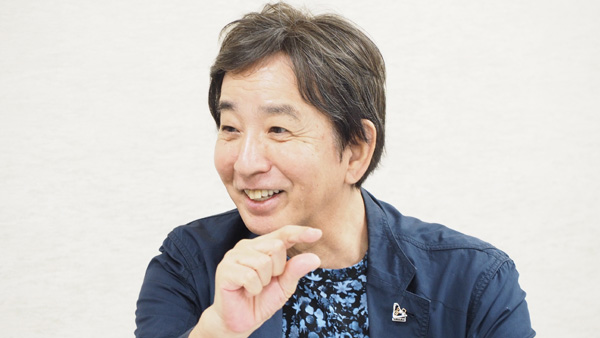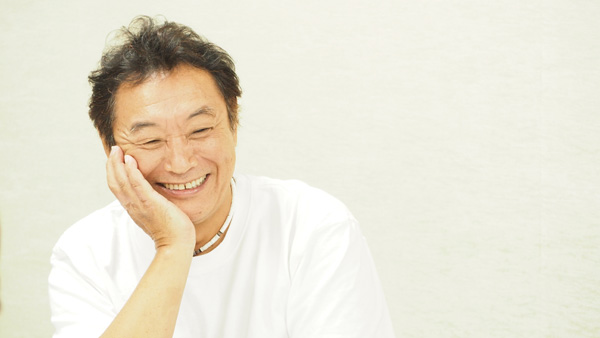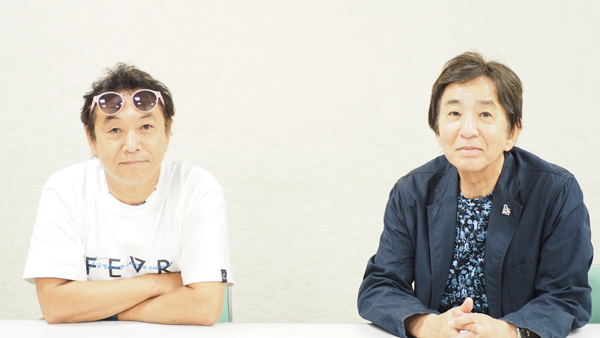SPECIAL
TALK SESSION
Kiyotaka Sugiyama × Tetsuji Hayashi
NEVER ENDING SUMMER REMIX
Special Interview
Ahead of the 40th anniversary in 2023 of the Japanese city pop group Kiyotaka Sugiyama & Omega Tribe, ‘the 40th Anniversary Remix Project’ has started under the supervision of an effective composer Tetsuji Hayashi.
This project is releasing re-mix albums incorporating the tracks from the original albums they had released from 1983 to 1985. They remixed all songs with the multiple sound sources of the time from the perspective of their recent interpretation to the sounds.
In addition, one of the songs in the new remix albums is the ‘re-arranged’ song as a bonus track.
The music label VAP has already released AQUA CITY REMIX and RIVER’S ISLAND REMIX since September 2021, and their third album NEVER ENDING SUMMER REMIX has released just now. This is a talking session between the frontman of the group Omega Tribe, Kiyotaka Sugiyama, and Tetsuji Hayashi, who supervised this remix album. Enjoy their memories of the time of 80s.
It might be said that was the time when I began to understand what music I wanted to make for Omega Tribe.
Sugiyama

── ‘The 40th Anniversary Remix Project’ has started with ‘Re-Mixed Tracks’ of the disc2 of OMEGA TRIBE GROOVE, which was released in January 2019. 12 tracks were remixed in it, and 9 additional tracks were subsequently remixed for the 7-inch single box release. the remix work has been carried out sequentially on the remaining 40 untouched album tracks. This is the third album NEVER ENDING SUMMER REMIX, following AQUA CITY REMIX and RIVER'S ISLAND REMIX. Given these albums, what do you have in mind?
Hayashi: When I listened to the re-mixed sound tracks for OMEGA TRIBE GROOVE, it had a big impact that sound separation was clearer. Also, Sugiyama-kun’s vocals can be heard more prominently now that the reverberation has been removed, and his singing has come clearly to the fore. As for the sound separation, I also discovered that I had done such interesting arrangements.
Sugiyama: I was surprised, that the sound I thought was ‘normal’ of that time was completely different, but what surprised me the most was how much clearer my voice sounded. I felt that trendy sounds were changing with the times.
── Yes, it’s clearly feel the reverberation is gone.
Sugiyama: That’s right.
Hayashi: Yeah, I think so too.
── I also get the impression that the chorus, the strings and the brass are more to the fore.
Sugiyama: That has increased the spread of the sound.
Hayashi: It’s like the sound that was hidden by the echoes has come out.
── Nowadays, the foggy sound image of those days is more disconcerting, or it can be said that this is a method of producing an 80s sound.
Hayashi: That would be the influence of AOR of that time.
Sugiyama: Foreign AOR sound had a feeling of reverb on the snare sound, didn’t it? That was the trend, so I guess I didn’t feel strange at that time.
── In the 80s, even the drum sounds themselves had a trendy sound.
Hayashi: I think the gated reverb sound started trending in Japan a little after Omega Tribe had started. That sounds like Phil Collins and so on.
Sugiyama: In the case of Omega Tribe albums, AQUA CITY doesn't have a lot of sounds, and there are fewer synths. After the release of RIVER’S ISLAND, the number of notes increases. If you pay attention to the number of notes and listen to these albums, the overall sound gets more spectacular with each album, and not just the drums. AQUA CITY was simple AOR, but after the release of RIVER’S ISLAND, the sound has changed dramatically.
Hayashi: I have the impression that both the staff and I understood Omega Tribe’s sound with RIVER’S ISLAND.
Sugiyama: Maybe so.
Hayashi: When I was making the songs for AQUA CITY, I was still trying out various things.
Sugiyama: For example, I suggested that a song I had written in my amateur days should be included on the album. It must have been a time for us to have trial and error to find our own direction.
── That’s how the third album NEVER ENDING SUMMER came about.
Hayashi: When I was working on this remix album, I realized again that Sugiyama-kun wrote the four A-side songs, except for the single “Riverside Hotel”. Listening to these songs, I think it must have been easier for him to write the songs because the direction they were aiming for with RIVER’S ISLAND was clear.
Sugiyama: That’s right. It was the time when I began to understand what music I wanted to make for Omega Tribe.
── The first song, “Misty Night Cruising” was the only Omega Tribe’s song composed by Mr. Sugiyama with lyrics by Mr. Chinfa Kan, so perhaps it was a candidate song for a single.
Sugiyama: I’m not so sure about that.
Hayashi: Hahaha.
── I have a hunch that producer Fujita also had a high opinion of the project.
Hayashi: That’s really true. Mr. Fujita kept a strong commitment to lyrics and also about the songs, but I think he appreciated this song. So it’s possible that (the reason this song didn't become a single) is because he was concerned about me.
Sugiyama: My first impression of this album was, ‘What’s a suite?’ But when I heard the accompaniment, I thought it had reached a new dimension.
── Did Mr. Fujita ask you to compose a suite of B-side for this album?
Hayashi: Yes. As this was Omega Tribe’s third album, I had some idea of what kind of songs they needed. But it was a suite, I wrote the main theme first, and then wrote four or five songs leading up to it. Then, in the end, I put them all together into four songs. The difficult part was setting the keys to connect the songs and how to give meaning to the arrangement. I used a common technique in classical music of ‘reprising’ the main theme at the beginning of “Never Ending Summer I” at the end.
── I think they were able to play a suite because they were mature as a band.
Hayashi: For better or worse, Mr. Fujita liked to say whatever came to his mind.
Sugiyama: Indeed.
Hayashi: He had very strong belief. Sometimes I thought, ‘That might be wrong,’ but it's probably amazing to think now that he conceived of the idea of a suite at that time.
── Was the key phrase ‘Never Ending Summer’ from the beginning?
Hayashi: I’m not sure about that but I think I didn’t have it when I started to write the song because it’s the part of the lyrics. The music in this suite is a good thing in its own right. But the most important thing in making a suite is the unity and flow of the lyrics.
Sugiyama: You have to complete the song as a story, right? The theme or worldview of the lyrics was Mr. Fujita’s idea, wasn’t it?
Hayashi: All lyrics for the suite were written by Mr. Yasushi Akimoto, but the concept was probably created by Mr. Fujita.
── This keyword ‘Never Ending Summer’ was used as the subtitle of the single “Futari no Natsu Monogatari - Never Ending Summer” later, wasn’t it?
Hayashi: That’s - was it in there from the beginning?
Sugiyama: I don’t know.
Hayashi: I remember when I was first working on that single, it didn’t have the key phrase in it. But halfway through making it, that phrase was in before I knew it.
I would be happy if people sense the greatness of the original sound that can be interpreted differently today.
Hayashi

── I know this is a bit late, Mr. Sugiyama’s early solo albums from his VAP days and a five-CD box of complete singles collections were released in June this year with remastered sound tracks. Meanwhile, Omega Tribe’s 40th anniversary project, which is currently running, is releasing a series of ‘remix’ tracks. Could you explain the difference between these ‘remasters’ and ‘remixes?’
Sugiyama: Remaster albums have been released in the past, including Warner-era recordings, but in terms of change, it’s probably easier to tell the difference with remixes. The remasters are digitally processed from the original recordings, but the sound cohesion is the same.
Hayashi: The remix work we are doing now includes sounds that were not heard in the original or patterns that were recorded but not adopted.
── “Do It Again” from RIVER’S ISLAND REMIX is pretty easy to understand for that changing.
Sugiyama: That changing is quite understandable. I can’t believe that kinds of sounds weren’t used in the songs back in the days and that happened a lot.
Hayashi: When it comes to NEVER ENDING SUMMER REMIX, you can hear the sound of brass many times in the song of “Eastern Railroad” Mr. Kenzo Shiguma arranged. That brass sound was muted in the first one, though.
Sugiyama: That brass sound brings a lot to this song.
Hayashi: I agree with that. I think it’s a lucky mistake that the truth of eliminating the recorded sound partially depending on the instruments in the song didn’t be written on the recording sheets. The engineers of this songs were different then. Mr. Eiji Uchinuma who is doing remixes this time has done a few recordings for Omega before they made a debut and Mr. Mizuo Miura was the assistant engineer then. But it can’t be that they remember every single detail. So they sent me as an sample the mixes they had recorded all the sound sources in the mulch-mix for starters. Then, I noticed the difference from the original and also noticed the sounds we didn’t even realized.
── What impressed you most about the differences between the original album and this remix album?
Hayashi: For example, in the bridge part of obrigado in “Never Ending Summer I”, in the original, the synths were the main part and the trombones sounded in such a balance that you had to listen carefully to hear them. So in this remix version, I decided not to play both, and only played the synths for the first and second time, and only played the trombones for the third time. I wonder if even the fan notice that differences.
Sugiyama: I think they are going to notice them because they have listened to it many times for a long time. Do you remember why you muted it at that time?
Hayashi: For this suite, as in the American recordings, I asked Mr. Ichiro Nitta to do the brass section, and I arranged the other parts and dubbed them over afterwards, so I didn’t have the score with me. That’s why I didn’t get it until later in the process. It was during the track down process.
Sugiyama: So that’s why!
Hayashi: Similarly, the interlude of “Riverside Hotel” is clearly divided in the original with a guitar solo in the first half and a string solo in the second half, but in this remix, strings are also heard behind the guitar solo in the first half.
Sugiyama: The fans are going to love that.
Hayashi: I don’t remember even I myself made it but I guess I wanted to remove the strings from the first half of the song.
── In those days, they recorded everything at first, and the production process was that there was plenty of time to make a final decision.
Sugiyama: That’s right.
Hayashi: Even the eliminated part of the original one but in this time take it back to the song.
Sugiyama: It’s also due to the fact that the sound separation has been improved.
Hayashi: Yes, that is definitely there.
Sugiyama: That’s cliche. Eliminated but 40 years later they got spotlight. Blessed situation like recorded with playing the brass and strings are eliminated.
Hayashi: It is now almost decided to compose of music structure in the pre-production process before recording. However, we had an only way in the past if we wanted to listen the pattern of the phrases being played by the brass. In that case, that’s the way we actually let them played.
── I see.
Hayashi: The attractiveness of Omega Tribe were clearness of ensemble, amazingly good vocal, and fantastic arrangement. Based on that, I hope the fans enjoy the greatness of the sounds as a present generation in a different way of feeling.
The melody of Japanese music can present without the chords. That’s the point they attract, I think.
Sugiyama

── I would like to know what you do in this project as the supervisor. Can you tell me in specific?
Hayashi: Sure. I listen first to the original ones with neutral state of mind and then listen to the new ones. It doesn’t mean I try to find the differences in the trivial things. If I try to find added sound or focus on comparing with the original and the new, it means I deny the piece of works the engineers created even though they tried their best to complete.
── It has a rearranged song as a bonus track in this series as well. The song Mr. Hayashi was in charged is a rearranged song, “Never Ending Summer I” following the EDM arranged song, “SUMMER SUSPICION” in the album, AQUA CITY REMIX.
Hayashi: Main purpose of this project is remixed albums not rearranged song. It’s a bonus, literally. When I created OMEGA TRIBE GROOVE I let a young musician arrange it freely passing the multiple data. I understand that the fans from the past like the original ones rather than new ones and easy to listen, I know that.
Sugiyama: You’re right.
Hayashi: I wanted to prove that the vocals of Sugiyama could fit in any arranged versions if it’s a totally different tone of music. That’s why I created “SUMMER SUSPICION” in EDM. For the people who are familiar with the original ones which the beat came in speeding up in double, the new ones sound strange a bit. I want them to listen the new ones as a brand-new released album not as revised ones forgetting about the original for a time being.
Sugiyama: We know some fans don’t like a rearranged one or a live arranged one, but I want them to listen letting them know the different type of approach to music.
── Speaking of your song, Mr. Sugiyama, Mr. Shiguma rearranged the bonus track “SAIGO NO NIGHT FLIGHT 86” in the previous album, RIVER’S ISLAND REMIX, didn’t he? The number of 86 in this title means BPM and this means the tempo in the new ones slowed down a bit than the original, I think. Is that close to the demo tape of you recorded then?
Sugiyama: I can’t remember what my demo tape was like… but I remember that I was surprised to know that saxophone solo has been changed with guitar solo instead in the song. I asked and found that Shinji Takashima played for recording of this rearranged song. That’s intriguing, anyway.
── Is there no limitation about this song on rearranging in a certain way? Don’t you mind if additional recording put in?
Sugiyama: No, I don’t mind. I would be fine as long as the fans are intrigued. It’s bonus.
── I’m curious about how you take a measure on rearranging the song, “Never Ending Summer I”.
Hayashi: “Never Ending Summer I” is the main theme of the suite. If I choose one song, it would be “I”. So I tried to put a reprise at the end when I started making it, but I had a second thought because it would be over seven minutes long. That’s too long, you know. In addition, if the middle part of the lyrics are missing, the whole meaning of them would change. I had done a lot of thinking then I ended up to decide not to connect the two songs together. It’s probably difficult story but the after part of changing speed ‘double tempo,’ two times faster, was not exactly ‘double tempo,’ numerically. Because of it, the first part of “I” and the after part of changing didn’t match with the SMTPE (time code for synchronisation used in recording at the time). So, we managed to make it work with today’s digital technology. Also, I tried to do the last chorus part by myself, but I couldn’t make the right atmosphere by multiplexing by myself. Therefore, I brought in the chorus from the ending part of “Never r Ending Summer IV ~ Prolog”. However, the timing of the chorus of the original “IV” was the type of chasing, so if I moved it to the top part, the third chorus would be discorded and I wouldn’t be able to get into it, so I had to modify it digitally to cope with that.
── That’s interesting. Thank you so much for telling me. The project is going on by releasing a remix album once in a half year. The next album will be a remix of ANOTHER SUMMER, which is best-selling album for Omega Tribe so far. You know, there is a data showing 80% of subscribers to one of the song in the album, “Futari no Natsu Monogatari” are the listeners in overseas.
Hayashi: I haven’t known that.
Sugiyama: I’ve heard of it. I read about that by something. My daughter in LA told me that our music were played so often there.
Hayashi: That’s nice.
Sugiyama: The reason why they like our music is melody, after all. The melody of Japanese music can present without chords. That’s the point everyone attracts, I think.
── That makes sense. Mr. Sugiyama, the next year, 2023, is 40th anniversary of your debut, right? Do you have any future vision of you or your band? Tell us about it if you don’t mind.
Sugiyama: I never mind telling you about it, but I don’t have any clear vision yet…
── You have changed members with young and fresh people when you have a live with the band, haven’t you?
Sugiyama: Yes, I have. I did it last year. The average age is 35 even including me.
Hayashi: Wow! That’s pretty young.
Sugiyama: I did it because I need energetic members. If I want to play the original songs as it is it needs energy for playing it. So there is a possibility veteran players could not keep up with it.
── Too matured to play it?
Sugiyama: The veteran players are very good, but they are tendency to like slow tempo. There’s possibility that we are going to head toward different ways on creating song.
Hayashi: That’s very possible.
── The next year, 2023, is also 50th anniversary of debut for Mr. Hayashi, right?
Sugiyama: Exactly! We want to do something together next year for our 40th and 50th anniversary.
Hayashi: It worth to wait!

Text: Hirohisa Tabuchi
Translation: Mami Yasugi

